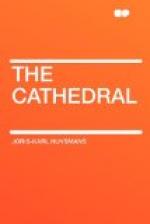“And unless the master were very exceptional, what a stone of stumbling!
“And then, besides this, which is to me the most important question of all, there are others worth considering. From the little I have been told by my two priests, the blessed silence of the Cistercians is not the rule with the black-frocked Orders. Now, however perfect these cenobites may be, they remain none the less men; or, to express it otherwise, sympathy and antipathy live in constant and compulsory friction; with very restricted subjects of discussion, living in complete ignorance of all that is going on outside, conversation must degenerate into chatter; at last the only interest of life centres in trivialities, in petty questions which in such an atmosphere assume the importance of events.
“A man becomes an old maid, and how infinitely wearisome must this talk be, unvaried by the unforeseen.
“Finally, there is the question of health. In the convent nothing but stews and salads! A disordered stomach before long, broken sleep, crushing fatigue in an ill-treated frame—ah, all that is neither attractive nor amusing! Who knows whether, after a few months of this mental and physical rule, I should not have sunk into bottomless dejection, whether the sloth of those monastic gaols would not have crushed me and left me absolutely incapable of thought or action?”
And he concluded:—
“It is madness to think of a cloistered life; I should do better to remain at Chartres.”
But hardly had he made up his mind not to move, when the reverse of the medal forced itself upon him.
A convent! Why, it was the only logical existence, the only right life! All these fears he suggested to himself were imaginary. In the first place, as to his health. Had he forgotten La Trappe, where the food was far more innutritious and the rule far stricter? Why be alarmed beforehand?
And, on the other hand, could he fail to perceive the need for conversation, the wisdom of speech, relieving the solitude of the cloister just when weariness might supervene? It was a remedy against constant introspection, and exercise taken with others secured health to the soul and gave tone to the body; and as for saying that these monastic dialogues would be trivial, were the conversations he might hear in any other society more edifying? In short, was not the company of the Brethren far superior to that of men of any profession, condition, or sort, whom he would be obliged to meet in the world outside?




